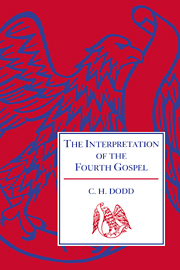C - The Book of the Passion
from PART III - ARGUMENT AND STRUCTURE
Published online by Cambridge University Press: 10 December 2009
Summary
THE FAREWELL DISCOURSES (xiii–xvii)
Main themes
The material of which these discourses are composed falls broadly into two classes: first, material corresponding to the ‘esoteric’ teaching comprised in the Synoptic Gospels, but enlarged and developed in a Johannine sense; and secondly, material corresponding to certain parts of the Book of Signs, but developed upon a new plane of significance. Under both heads there is much fresh teaching, but it may be regarded as expansion of topics already present under one or other of these heads.
(i) The discourses contained in these chapters are all represented as addressed to the disciples in private. In the Book of Signs there is no such ‘esoteric’ teaching, apart from the calling of disciples in ch. i. 37–51, the brief conversation with disciples at Jacob's Well in ch. iv. 31–8, and the scene of Peter's confession in ch. vi. 66–71.
In the Synoptic Gospels on the contrary private instruction of an inner circle occurs from time to time all through the ministry, alternating with public teaching. The themes of such teaching (if we neglect those places where it is simply a device of the evangelists to introduce interpretations of parables) may be classified as follows:
A. Precepts, warnings and promises for the disciples.
The mission of the disciples to the world (Matt. ix. 35–x. 16, Mark vi. 7–11, Luke ix. 1–6, x. 1–16).
Precepts for conduct within the Christian community (Mark ix. 33–50, x. 35–45 and parallels).
- Type
- Chapter
- Information
- The Interpretation of the Fourth Gospel , pp. 390 - 443Publisher: Cambridge University PressPrint publication year: 1953

